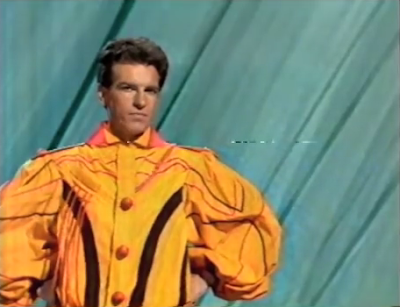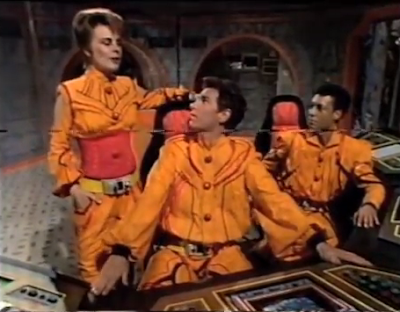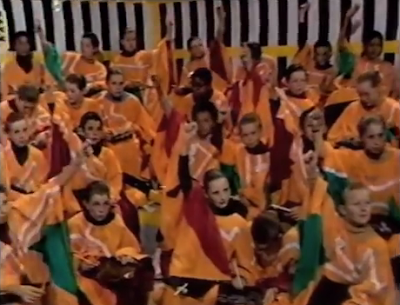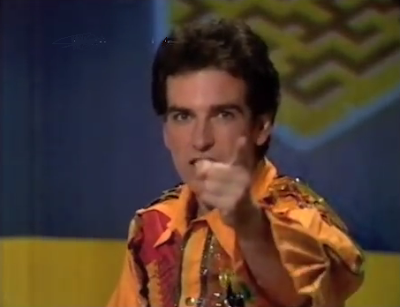On 2nd June 1979, arguably the weirdest idea for a Saturday Morning TV show ever - and less arguably the most technically ill-advised - set sail around the ITV regions. Launched by Granada on a wave of local talent,
The Mersey Pirate was ambitious, live, witty, and conspicuously up to date with current trends in pop music. It was also broadcast live from the middle of a notoriously weather-battered body of water, and, well, a bit of a mess. But the kind of compelling, memorable and glorious mess that you just don't get in this slicker and more sophisticated age, when people actually sit down and think before putting programmes on air.
Inspired in no small part by Gerry And The Pacemakers' 1964 top ten hit
Ferry Cross The Mersey,
and the modicum of lasting international fame that this had given the
handful of boats that lurch daily between Liverpool, Birkenhead and
Wallasey,
The Mersey Pirate commandeered long-serving ferry The
Royal Iris for a weekly splash of Saturday Morning fun. Literally
commandeered in fact, as the show occupied every last corner of this
ad-hoc floating television studio, including - most infamously - the deck. If you're already thinking that sounds like a somewhat precarious arrangement, then just you wait. You really haven't heard the half of it yet.
Launched on 28th April 1951, The Royal Iris was as dedicated to leisure cruises as it was to the practicalities of daily commuting, boasting a dancefloor and stage, tea room, buffet, cocktail bar and even its own miniature fish and chip shop. Needless to say it was a popular choice for Mersey-crossing as part of days and indeed nights out, and doubtless foremost in Gerry Marsden's thoughts when he sat down to write
Ferry Cross The Mersey; though the film based on the song - now probably never likely to be seen again on account of its heavy Savile content - was actually shot aboard less elaborately-appointed rival ferry the Mountwood, while that weird colour promo film with Gerry and assorted inauthentic-looking 'Pacemakers' scampering about the deck with distinctly seventies haircuts was filmed on the Woodchurch. It would clearly take something more ambitious, technically complex, bewilderingly concieved and simultaneously surfing trends and not understanding what they actually
were to begin with to get The Royal Iris on screen. And that's precisely what
The Mersey Pirate was.
With ATV's groundbreaking outburst of Saturday Morning mayhem
Tiswas having proved an unexpected phenomenon when it finally started edging out into other regions, rival ITV broadcasters were only too keen to get in on the act and set out to provide their own distinctive take on this wild combination of comedy, cartoons, heavy viewer interaction and general air of not particularly controlled anarchy. Quickest off the mark were LWT with
Our Show, which unwisely handed over the presentational reins to 'talented' youngsters, and Southern with
Saturday Banana, which saw Bill Oddie and Metal Mickey doing their best to achieve wackiness without even a fraction of the resources available to Chris Tarrant and company (and yes, Oddie did indeed contribute a heavily funk-inflected and tune-deficient theme song). Always one of the artier and more technologically ambitious of the ITV regional franchise holders, Granada instead took a look at what was literally to hand, and decided on a format that would involve doing their live two-and-a-bit-hours of weekend entertainment from a working ferry and using almost exclusively local talent. Thus it was that a weird geodesic dome was constructed on the deck of The Royal Iris, a hapless 'backroom boy' stood on top of a building in the then-rundown docklands holding out a UHF receiver, and
The Mersey Pirate cast off into uncharted and decidedly choppy televisual waters.
The basic conceit of
The Mersey Pirate - not a million miles from the technological truth, if we're being honest about it - was that it was an actual 'pirate' broadcast, breaking in to the ITV transmission for unathorised Saturday Morning fun with the aid of a cobbled-together broadcast setup. This was actually something of a hot topical issue at the time, with the dawn of public access media hovering close on the horizon, and Vrillion Of Ashtar Galactic Command having only recently hijacked Southern TV's news programme to spread his intergalactic message of peace and love. A very different kind of 'anarchy' to
Tiswas, but one that nonetheless caught the imagination of a large percentage of its target audience, and in particular the ones who could more normally be found 'playing' television with the aid of a modified cardboard box and reluctantly recruited 'studio guests'.
However, with little in the way of contemporary inspiration to draw on,
The Mersey Pirate looked back instead to a similar phenomenon from the recent past, and styled itself loosely on the poptastic Pirate Radio boats that had so irked and eluded the authorities in the mid-sixties, with attendant Merseybeat reference points to boot. To this end, the presenters were all assigned nautical roles; club comic Duggie Brown, then well known to viewers for his Shep's
Banjo Boys-accompanied gagsmithery on Granada's famously 'unpolished'
standup show
The Comedians, was the nominal host, or
'Captain', of both the boat and the pirate broadcast. Voluble Radio City
DJ Billy Butler, the very definition of 'locally famous', was the
'Entertainments Manager', alongside comedy folk-singing 'Bolton
Bullfrog' Bernard Wrigley as the ship's chef, up and coming actor Paul
Clayton as the Chief Petty Officer, and Frank Carson as a sort of
gag-crazed Long John Silver. Also along for the ride - not that any of the above were aware of it - were a couple of somewhat less reputable youngsters.
Philosophical teenage tearaway Franny Scully and his somewhat less philosophical sidekick Mooey had first appeared in the mid-seventies, in a series of short plays that Alan Bleasdale had written for Radio Merseyside. In 1977 Bleasdale adapted the plays into a best-selling novel, which led to the BBC commissioning
Scully's New Year's Eve, an energetic and sharply funny entry in the ever-unpredictable
Play For Today strand, for broadcast on 1st January 1978. Andrew Schofield and Ray Kingsley would later rerprise their respective roles as Scully and Mooey for the 1984 mini-series
Scully, which is both as vivid a snapshot of rough-and-ready four letter-friendly early Channel 4 as you're likely to find, and for an entire generation the ultimate example of the Programme You Had To Sneakily Watch On The Portable. In between came this unusual engagement, recasting the pair as stowaways who snuck aboard the ferry each week, incurring the somewhat hypocritical wrath of the 'pirates' but inevitably doted on by the old dears who did the actual on-board work. Ironically, given that they are the most established and well-realised characters in the whole setup, Scully and Mooey are a large part of the reason why
The Mersey Pirate didn't really 'work'. Bleasdale's high quality and genuinely witty material sits jarringly in the middle of other less sophisticated comic dialogue - sometimes literally in the middle of it, as there are times that it seems like he's added their lines into someone else's sketches - and the transition between the two is never exactly easy.
In contrast to their more cerebral musings, Duggie Brown and Billy Butler proved a particularly effective combination, with the former's polished audience-ready approach working well against the latter's more sharp and quick-witted pop DJ style. Bernard Wrigley lent a suitably manic air as he improvised and over-acted wildly around scripted sketch material, and Frank Carson - who of course could also be found appearing regularly on
Tiswas - was essentially just Frank Carson, albeit with a neat running gag about the on-board child audience fleeing in terror from his awful puns as he read out the 'Pirate News At Eleven'. Also perhaps more suitable for the majority of the target audience were the Dave Prowse-devised 'keep fit' segement Ship Shape, fashion tips from local radio presenter Therese Birch - host of the part-networked LBC children's show
Jelly Bone - in Decked Out, a weekly update on the Top Twenty, and the energetic open air games played whenever weather permitted. And as we shall see, those last three words were key to the strange tale of
The Mersey Pirate.
However, before Scully and Mooey become too consumed with existentialist angst, it's worth pointing out that the show also did a great deal to reflect the more esoteric and fashion-conscious tastes of a certain percentage of its intended audience, aware as they were that strange post-punk things were happening right on their doorstep. The theme music was a frantic slap bass-led discofied reworking of
Ferry Cross The Mersey, and there were plenty of filmed insert features on local artistic happenings, while The Royal Iris' ballroom - which not that long ago had played host to The Beatles and company - became the ship's 'disco', home to performances by the suspiciously hip'n'happening likes of Echo & The Bunnymen, Lene Lovich, Bad Manners and and The Undertones; in reality, they were probably the only bands who were both near enough and prepared to get up at that hour on a Saturday morning. Meanwhile, although this will have meant little to anyone outside of the immediate vicinity, Granada were keen to play up the 'pirate broadcast' conceit in a very real and interactive sense. Much-coveted Mersey Pirate mugs and 'I SAW THE MERSEY PIRATE' badges
were distributed to those hardy souls who had spent the duration of the
show languishing in the grim breeze-battered surroundings of the Pier
Head, waiting to cheer the ship's company back in to shore, and they even staged an 'open day' inviting all and sundry (including a certain aspirant TV historian youngster) to wander around the ferry and see how the show was made, the results of which were filmed and shown as a mini-documentary as part of the following Saturday's edition.
However, it was to be precisely those feats of dockside technical wizardry that would guide
The Mersey Pirate onto the rocks. Adverse weather conditions would regularly cause outdoor features to be delayed or abandoned, leading to improvised fill-ins with Butler chasing Mooey and Scully around indoors, and would also wreak havoc with the precarious broadcast setup, causing sound and picture interference and even on occasion scuttling the entire programme, prompting the hasty deployment of old cartoons and film serials to fill the resultant gap in the schedules.
The Mersey Pirate sailed merrily on, but a genuine squall was looming in the form of the technicians' strike that blacked out the entire ITV network over the late summer of 1979. This unexpected interruption more or less did for the series, which would otherwise have run through to mid-September. Small wonder, then, that it's almost impossible to accurately pinpoint exactly how many editions of
The Mersey Pirate actually went out - and indeed how much of each one went out - between 2nd June and the last
TV Times-billed edition on 25th August 1979.
The Mersey Pirate had certainly been given a high profile launch, with prominent
TV Times listings and a coveted
Look-In cover feature, but even that wasn't enough to stop it from being washed overboard. Yet even aside from the technical problems and the sheer bad luck, its biggest stumbling block was that it was in many ways both behind and ahead of the times. The show did its best to capitalise on the rise of a new wave of Liverpool-based pop acts but was literally a couple of months too early for this; and at the same time it harked back to nostalgia for an era that even many of the Merseybeat region's own inhabitants had yet to get properly nostalgic for. In many ways, it was an unsuccessful attempt to do what the similarly-inclined
The 8:15 From Manchester would manage to pull off a decade later, proving that there maybe is something in this rivalry business after all. Some of the cast would show up in character in local panto later in the year, but to all intents and purposes that was the end of
The Mersey Pirate. Granada would try again the following year with
Fun Factory, a gag-heavy and decidedly indoors effort that retained Billy Butler and Therese Birch alongside newcomers Gary Crowley, Jeremy Beadle and Kurt Knobbler the robot, which proved successful enough to return in 1981. After that they perhaps wisely decided to leave Saturday Mornings to their competitors.
Unfortunately, there are apparently only two and a bit editions of
The Mersey Pirate still in existence - reportedly due to technical issues preventing the live broadcasts from being satisfactorarily recorded (cue a deafening chorus of archive TV obsessives getting angry about salt water on forums) - and neither and a bit of them appear to feature the 'Open Day'. Meanwhile, the poor old Royal Iris was taken out of active service in 1991, upon which it was bought by a business consortium who intended to turn it into a 'floating nightspot' but were denied planning permission, and has basically just sat around rusting ever since. In 2010, it was reported that the RNLI had disturbed some intruders on board the boat; presumably, Scully and Mooey's alibis are intact.
You can find lots more about bizarre TV shows that history forgot in my book Not On Your Telly.













































